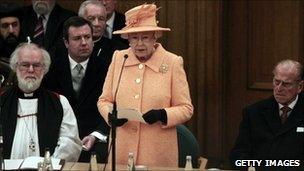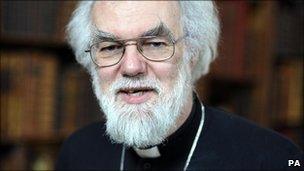Queen gives warning to Church of England synod
- Published

The Queen told the synod's members that the Church of England faced "many issues"
The Queen has spoken of the "difficult" and "painful" choices facing the Church of England as she formally opened the Church's general synod.
She also spoke of the "need to communicate the gospel with joy and conviction in our society".
The Queen addressed the 476 members of the Church's governing body as they marked the start of a five-year term.
The synod will also debate measures to keep the Church together over issues such as same-sex blessings.
And its members are preparing to discuss Prime Minister David Cameron's "big society" idea.
Before her address, the Queen, who is supreme governor of the Church of England, attended a service of Holy Communion at Westminster Abbey, accompanied by the Duke of Edinburgh.
Speaking at the synod meeting, she said: "The new synod will have many issues to resolve to ensure that the Church of England remains equipped for the effective pursuit of its mission and ministry.
"Some will, no doubt, involve difficult, even painful, choices.
"But Christian history suggests that times of growth and spiritual vigour have often coincided with periods of challenge and testing.
"What matters is holding firmly to the need to communicate the gospel with joy and conviction in our society."
The Queen also said a "preoccupation with our welfare and comfort" were not "at the heart of our faith" but rather "the concepts of service and of sacrifice as shown in the life and teachings of the one who made himself nothing, taking the very form of a servant".
During her address, the Queen said the place of religion had come to be a matter of "lively discussion" in a more "diverse and secular" society.
"It is rightly acknowledged that people of faith have no monopoly of virtue and that the well-being and prosperity of the nation depend on the contribution of individuals and groups of all faiths and none," she said.
"Yet, as the recent visit of His Holiness the Pope reminded us, churches and the other great faith traditions retain the potential to inspire great enthusiasm, loyalty and a concern for the common good."
There was applause at the synod meeting when the Archbishop of Canterbury, Dr Rowan Williams, expressed "delight" at the forthcoming marriage of Prince William and Kate Middleton.
'Casualty stations'
Addressing the Queen, he said: "I am sure I speak for everyone here in expressing our delight at the family news announced last week."
Also speaking at the synod meeting, Dr Williams said he wanted to avoid the worst aspects of "secular partisanship" by the Archbishop of Canterbury.
He urged members not to reject the Anglican Covenant, a proposed agreement aimed at resolving disputes within the worldwide Anglican Communion.
The idea was first put forward in the Windsor Report in 2004 in response to tensions within the Anglican Communion following the consecration in the US of Gene Robinson, who is openly gay, as a bishop in New Hampshire.
And it is an "illusion" to believe the Anglican Communion can "carry on as usual" in the face of splits over issues such as the consecration of openly gay bishops and same sex blessings, Dr Williams warned.
"If we ignore this, we ignore what is already a real danger, the piece-by-piece dissolution of the Communion and the emergence of new structures in which relation to the Church of England and the See of Canterbury are likely not to figure significantly," he said.
BBC religious affairs correspondent Robert Pigott says one of the most important laws likely to emerge during the synod's coming five-year period is the introduction of women bishops.
The issue has been deeply divisive between liberal and traditionalist parts of the Church.

The Archbishop of Canterbury has voiced concerns about proposed government welfare cuts
And Dr Williams said the prime minister's vision of a "big society" had provided an "extraordinary" opportunity to debate questions about "character, virtue, generosity and justice".
Dr Williams has previously said he is "very anxious" about planned government welfare cuts, saying housing benefit reforms could result in "social zoning", and that plans for the long-term unemployed to do unpaid work risked a "downward spiral of uncertainty, even despair".
The Reverend Mark Beach, from Rugby, told the synod that funds to the voluntary sector should not be cut if a "big society" was to become a reality.
"If a big society is about enabling local people to fulfil their aspirations then I am all for it, if what is achieved is a real shift of power from Whitehall which reduces red tape and allows people to get on with it, then all well and good," he said.
"But we are already seeing that other big agenda item - the government's biggest, that of reducing the budget deficit - having an impact on the capacity to support the voluntary sector."
The Bishop of Blackburn, the Right Reverend Nicholas Reade, warned that churches should not "simply be seen" as "casualty stations" for those "wounded" by spending cuts.
- Published23 November 2010
- Published13 July 2010
- Published12 July 2010